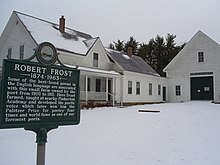Mending Wall

Stone wall at Frost's farm in Derry, New Hampshire, which he describes in "Mending Wall"
Wikisource has original text related to this article: Mending Wall |

It was at this farm in Derry, New Hampshire, that Robert Frost wrote "Mending Wall", while he lived here from 1901–1911.
"Mending Wall" is a poem by the twentieth century American poet Robert Frost (1874–1963). It opens Frost's second collection of poetry, North of Boston,[1] published in 1914 by David Nutt, and it has become "one of the most anthologized and analyzed poems in modern literature".[2]
Like many of the poems in North of Boston, "Mending Wall" narrates a story drawn from rural New England.[3] The narrator, a New England farmer, contacts his neighbor in the spring to rebuild the stone wall between their two farms. As the men work, the narrator questions the purpose of a wall "where it is we do not need the wall" (23). He notes twice in the poem that "something there is that doesn’t love a wall" (1, 35), but his neighbor replies twice with the proverb, "Good fences make good neighbors" (27, 45).
Noted philosopher and politician Onora O'Neill uses the poem to preface her 2016 book, Justice Across Boundaries: Whose Obligations?[4]
Themes
Despite its simple, almost folksy language, "Mending Wall" is a complex poem with several themes, beginning with human fellowship, which Frost first dealt with in his poem "A Tuft of Flowers" in his first collection of poems, A Boy's Will.[5] Unlike the earlier poem which explores the bond between men, "Mending Wall" deals with the distances and tensions between men.[6] The poem explores the contradictions in life and humanity, including the contradictions within each person, as man "makes boundaries and he breaks boundaries".[7][8] The poem also explores the role of boundaries in human society as mending the wall serves both to separate and to join the two neighbors, another contradiction.[9] "Mending Wall" also plays with the theme of seasons as recurring cycles in life, and contrasts those cycles with both physical and language parallelism as the men walk along the wall, each to a side, and their language stays each to a side.[10] Then, in "Mending Wall", Frost meditates on the role of language as a kind of wall that both joins and separates people.[11][12] Finally, Frost explores the theme of mischief and humor in "Mending Wall", as the narrator says halfway through the poem, "Spring is the mischief in me, and I wonder/If I could put a notion in his head" (28,29). Mending the wall is a game for the narrator, though in contrast, the neighbor seems quite serious about the work. The narrator notes how the neighbor seems to be walking not only in the thick shade of woods and trees, but in actual "darkness", implying ignorance and/or inhospitable sentiments.[13][14][15]
References
^ Monteiro, George (1988). Robert Frost & the New England renaissance. Lexington, Ky: University Press of Kentucky. p. 123. ISBN 0-8131-1649-X..mw-parser-output cite.citation{font-style:inherit}.mw-parser-output .citation q{quotes:"""""""'""'"}.mw-parser-output .citation .cs1-lock-free a{background:url("//upload.wikimedia.org/wikipedia/commons/thumb/6/65/Lock-green.svg/9px-Lock-green.svg.png")no-repeat;background-position:right .1em center}.mw-parser-output .citation .cs1-lock-limited a,.mw-parser-output .citation .cs1-lock-registration a{background:url("//upload.wikimedia.org/wikipedia/commons/thumb/d/d6/Lock-gray-alt-2.svg/9px-Lock-gray-alt-2.svg.png")no-repeat;background-position:right .1em center}.mw-parser-output .citation .cs1-lock-subscription a{background:url("//upload.wikimedia.org/wikipedia/commons/thumb/a/aa/Lock-red-alt-2.svg/9px-Lock-red-alt-2.svg.png")no-repeat;background-position:right .1em center}.mw-parser-output .cs1-subscription,.mw-parser-output .cs1-registration{color:#555}.mw-parser-output .cs1-subscription span,.mw-parser-output .cs1-registration span{border-bottom:1px dotted;cursor:help}.mw-parser-output .cs1-ws-icon a{background:url("//upload.wikimedia.org/wikipedia/commons/thumb/4/4c/Wikisource-logo.svg/12px-Wikisource-logo.svg.png")no-repeat;background-position:right .1em center}.mw-parser-output code.cs1-code{color:inherit;background:inherit;border:inherit;padding:inherit}.mw-parser-output .cs1-hidden-error{display:none;font-size:100%}.mw-parser-output .cs1-visible-error{font-size:100%}.mw-parser-output .cs1-maint{display:none;color:#33aa33;margin-left:0.3em}.mw-parser-output .cs1-subscription,.mw-parser-output .cs1-registration,.mw-parser-output .cs1-format{font-size:95%}.mw-parser-output .cs1-kern-left,.mw-parser-output .cs1-kern-wl-left{padding-left:0.2em}.mw-parser-output .cs1-kern-right,.mw-parser-output .cs1-kern-wl-right{padding-right:0.2em}
^ Freeman, Margaret H. "The Fall of the Wall between Literary Studies and Linguistics: Cognitive Poetics". Social Science Research Network. Social Science Electronic Publishing, Inc. SSRN 1427373. Missing or empty|url=(help)
^ "Robert Frost's "Mending Wall": A Marriage of Poetic Form and Content". EDSITEment. National Endowment for the Humanities. Retrieved 5 May 2015.
^ O'Neill, Onora (2016-02-15). Justice across Boundaries: Whose Obligations?. Cambridge University Press. ISBN 9781316495476.
^ Monteiro, George (1988). Robert Frost & the New England renaissance. Lexington, Ky: University Press of Kentucky. p. 123. ISBN 0-8131-1649-X.
^ Monteiro, George (1988). Robert Frost & the New England renaissance. Lexington, Ky: University Press of Kentucky. p. 127. ISBN 0-8131-1649-X.
^ Holland, Norman (1988). The brain of Robert Frost. New York: Routledge. ISBN 0415900239.
^ Sheikhzadeh, Ebrahim; Ouladian, Masoumeh; Adi, Ida Rochani (2013). "American Humor in Promoting the Talk over the Wall with a Focus on Robert Frost's Poems". International Journal of Social Sciences. 3 (2): 60. Retrieved 5 May 2015.
^ Monteiro, George (1988). Robert Frost & the New England renaissance. Lexington, Ky: University Press of Kentucky. pp. 127–129. ISBN 0-8131-1649-X.
^ Holland, Norman (1988). The brain of Robert Frost. New York: Routledge. ISBN 0415900239.
^ Monteiro, George (1988). Robert Frost & the New England renaissance. Lexington, Ky: University Press of Kentucky. p. 127. ISBN 0-8131-1649-X.
^ Holland, Norman (1988). The brain of Robert Frost. New York: Routledge. ISBN 0415900239.
^ Monteiro, George (1988). Robert Frost & the New England renaissance. Lexington, Ky: University Press of Kentucky. p. 127. ISBN 0-8131-1649-X.
^ Holland, Norman (1988). The brain of Robert Frost. New York: Routledge. ISBN 0415900239.
^ Sheikhzadeh, Ebrahim; Ouladian, Masoumeh; Adi, Ida Rochani (2013). "American Humor in Promoting the Talk over the Wall with a Focus on Robert Frost's Poems". International Journal of Social Sciences. 3 (2): 51–70. Retrieved 5 May 2015.
External links
| Wikiquote has quotations related to: Robert Frost |
- "Mending Wall" at Poets.org
- Discussion and analysis of "Mending Wall"